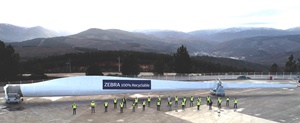 The ZEBRA (Zero wastE Blade ReseArch) consortium has announced the production of the first prototype of its 100% recyclable wind turbine blade. The 62m blade was made using Arkema’s Elium resin, which is a thermoplastic resin well known for its recyclable properties together with the new high performance Glass Fabrics from Owens Corning.
The ZEBRA (Zero wastE Blade ReseArch) consortium has announced the production of the first prototype of its 100% recyclable wind turbine blade. The 62m blade was made using Arkema’s Elium resin, which is a thermoplastic resin well known for its recyclable properties together with the new high performance Glass Fabrics from Owens Corning.Launched in September 2020, the ZEBRA (Zero wastE Blade ReseArch) project is a partnership led by French research center IRT Jules Verne and brings together industrial companies including Arkema, Canoe, Engie, LM Wind Power, Owens Corning and Suez. Its purpose is to demonstrate the technical, economic, and environmental relevance of thermoplastic wind turbine blades on a full scale, with an eco-design approach to facilitate recycling.
Within the project, LM Wind Power has designed and built the thermoplastic blade at its Ponferrada plant in Spain. This \ is achieved after a year of material development and testing backed by sub-component level process trials by the consortium partners. The liquid thermoplastic resin is adapted for the manufacturing of large parts by resin infusion, combined with Owens Corning fabrics. The resulting composite material is delivering similar performances to thermoset resins but can be recycled.
Elium based composite components can be recycled using a method called chemical recycling that enables to fully depolymerise the resin, separate the fiber from the resin and recover a new virgin resin & High Modulus Glass ready to be reused, closing the loop. This method, developed by Arkema and Canoe partners, are tested on all composite parts including waste generated from production. Owens Corning is also in charge of finding solutions for fiberglass recycling through remelting or reusing in various applications.
In addition to material testing and process trials, the companies have also made progress on developing and optimising the manufacturing process by using automation, to reduce energy consumption and waste from production.
LM Wind Power will now start full-scale structural lifetime testing at its Test and Validation Centre in Denmark, to verify the performance of the composite material used in making the blade and its feasibility for future sustainable blade production. Once these tests are finished, the End Of Life recycling methods will also be validated. The next steps are the recycling of production waste, the dismantling and recycling of this first blade and the analysis of the test results.